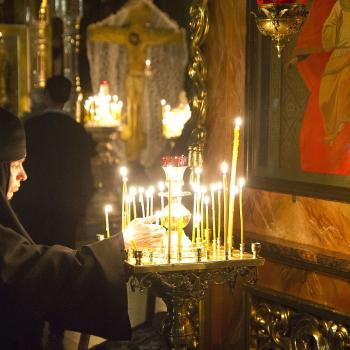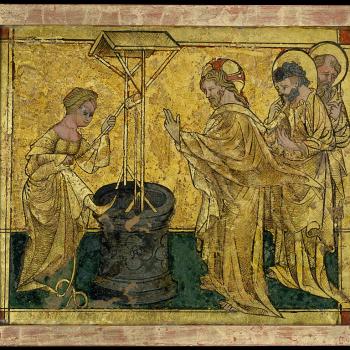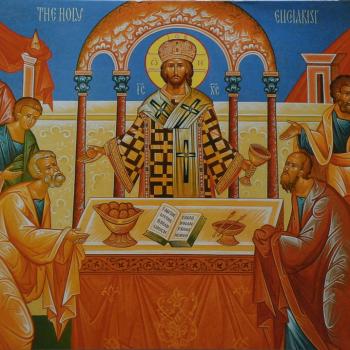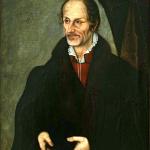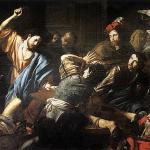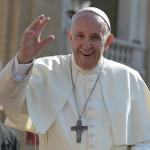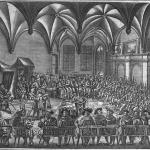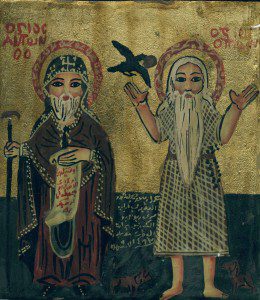
We are called to be charitable with each other, but sadly, we often list our worst instincts get in the way of our charity. We let our worst thoughts and inclinations get the best of us, so that even minor things can end up leading us to be unjustly angry at someone else and wishing them harm. This is true, even if we have the best of intentions, even if we know we should be charitable, as two monks came to find out:
Abba Nicetas said of two brothers that they met with the intention of living together. The first thought within himself, ‘If my brother wants something, I will do it,’ and the second thought the same. ‘I will do the will of my brother.’ So they lived many years in great charity. Seeing this, the enemy set out to separate them. He stood at the entrance of the cell, appearing to one like a dove and to the other like a raven. The first said, ‘Do you see that little dove?’ The other said, ‘It is a raven.’ They begun to argue and to contradict one another, then they stood up and fought till they drew blood, to the great joy of the enemy; and they separated. After three days they returned and came to their senses and each asked the other’s forgiveness. They recognized that each of them had believed the bird to be what he had seen and recognized that their conflict came from the enemy. So they lived to the end without being separated. [1]
The two monks wanted to share their spiritual journey together, and they did so with a bond of love, so that they tried to put the will of the other above their own. However, over time, that bond must have weakened, because they let a petty disagreement get in the way of their love. They both saw what seemed to be a bird, but each of them believed they saw a different kind of bird, and because of that, they believed it was so important to have the other believe what they thought they saw was the truth, they became focused on proving that point instead of affirming the common bond of charity they once had. They lost sight of the greater truth, the truth of love. Their conflict quickly became physical, having them get into a fight and hurt each other.
What the monks were debating was rather insignificant: did they see a dove or a raven? Why did either of them think it mattered? Because, like all of us, once they came to a conclusion and believed they knew some fact or some element of the truth, they got so stuck in what they believed they knew instead of being willing to consider the reasons why they might have been mistaken. Perhaps, there was a sense of pride involved, because often those who think they know some element of the truth become prideful in what they know, and through such pride, they become unwilling to be corrected or to learn more. Such pride, when it is confronted with resistance, often leads to anger and resentment, until, at least, if it is not stopped, it leads to anger, to malice, and all kinds of uncharitable actions.
Eventually, the monks came to understand their mistake and forgive each other, realizing that it is better to work together and promote the common good, and the love which is used to establish it, than it is to promote one’s own private agenda. This is what we should learn from the story as well. Sadly, what is seen in reflected in the story is a common problem; pride, especially pride in what one thinks they know, easily leads people to prop themselves up at the expense of others, and in doing so, leads them to their own ruin, as St. Gregory the Great warned:
For indeed he establishes himself in his own mind on a certain lofty eminence, and, though bound together in the same condition of nature with others, he disdains to regard others from the same level; and so he comes to be even like him of whom it is written, He beholds all high things: he is a king over all the children of pride. Nay, aspiring to a singular eminence, and despising the social life of the angels, he says, I will place my seat in the north, and I will be like the Most High . Wherefore through a marvellous judgment he finds a pit of downfall within himself, while outwardly he exalts himself on the summit of power. For he is indeed made like the apostate angel , when, being a man, he disdains to be like men. Thus Saul, after merit of humility, became swollen with pride, when in the height of power: for his humility he was preferred, for his pride rejected; as the Lord attests, Who says, When you were little in your own sight, did I not make you the head of the tribes of Israel ? He had before seen himself little in his own eyes, but, when propped up by temporal power, he no longer saw himself little. For, preferring himself in comparison with others because he had more power than all, he esteemed himself great above all. Yet in a wonderful way, when he was little with himself, he was great with God; but, when he appeared great with himself, he was little with God.[2]
We should recognize the limitations of our knowledge. We should realize that truth without love is not the fullness of the truth, and so, if we embrace it without love, our comprehension of the truth is far less than we think it is. With such proper self-understanding, we will free ourselves from becoming too rigid; we will be able to appreciate and learn from others. Of course, this should not lead us to some sort of nihilistic relativism which assumes there is no objective truth, or that someone might not apprehend more of that truth than someone else. But what it should do is help us accept the fallible nature of all such apprehensions and so to seek to understand what others have perceived and understand and why they have done so. Even if and when others can be shown to be wrong, we should respond to them in charity not pride, for if we respond in pride, we will likely have them respond to us in kind, causing the kind of rift and conflict we have seen not only in the story Nicetas gave concerning the two monks. To avoid conflict, to embrace the greater expectation of love, we need to accept that others will think and believe differently than we dos, and that if they do, we are not to fight them, trying to force us to see things the way we do. For in reality, we cannot force them to do so, but with love and cooperation, we are more likely to have them listen to us and consider what it we have to offer even as we will be able to listen to them and learn from them what the have to offer, allowing everyone to grow, not just in knowledge, but in wisdom.
[1] The Sayings of the Desert Fathers. trans. Benedicta Ward (Kalamazoo, MI: Cistercian Publications, 1984), 157 [Saying of Nicetas #1].
[2] St. Gregory the Great, Pastoral Rule. Trans. James Barmby, DD in NPNF2(12): 14-15.
Stay in touch! Like A Little Bit of Nothing on Facebook.
If you liked what you read, please consider sharing it with your friends and family!
N.B.: While I read comments to moderate them, I rarely respond to them. If I don’t respond to your comment directly, don’t assume I am unthankful for it. I appreciate it. But I want readers to feel free to ask questions, and hopefully, dialogue with each other. I have shared what I wanted to say, though some responses will get a brief reply by me, or, if I find it interesting and something I can engage fully, as the foundation for another post. I have had many posts inspired or improved upon thanks to my readers.








